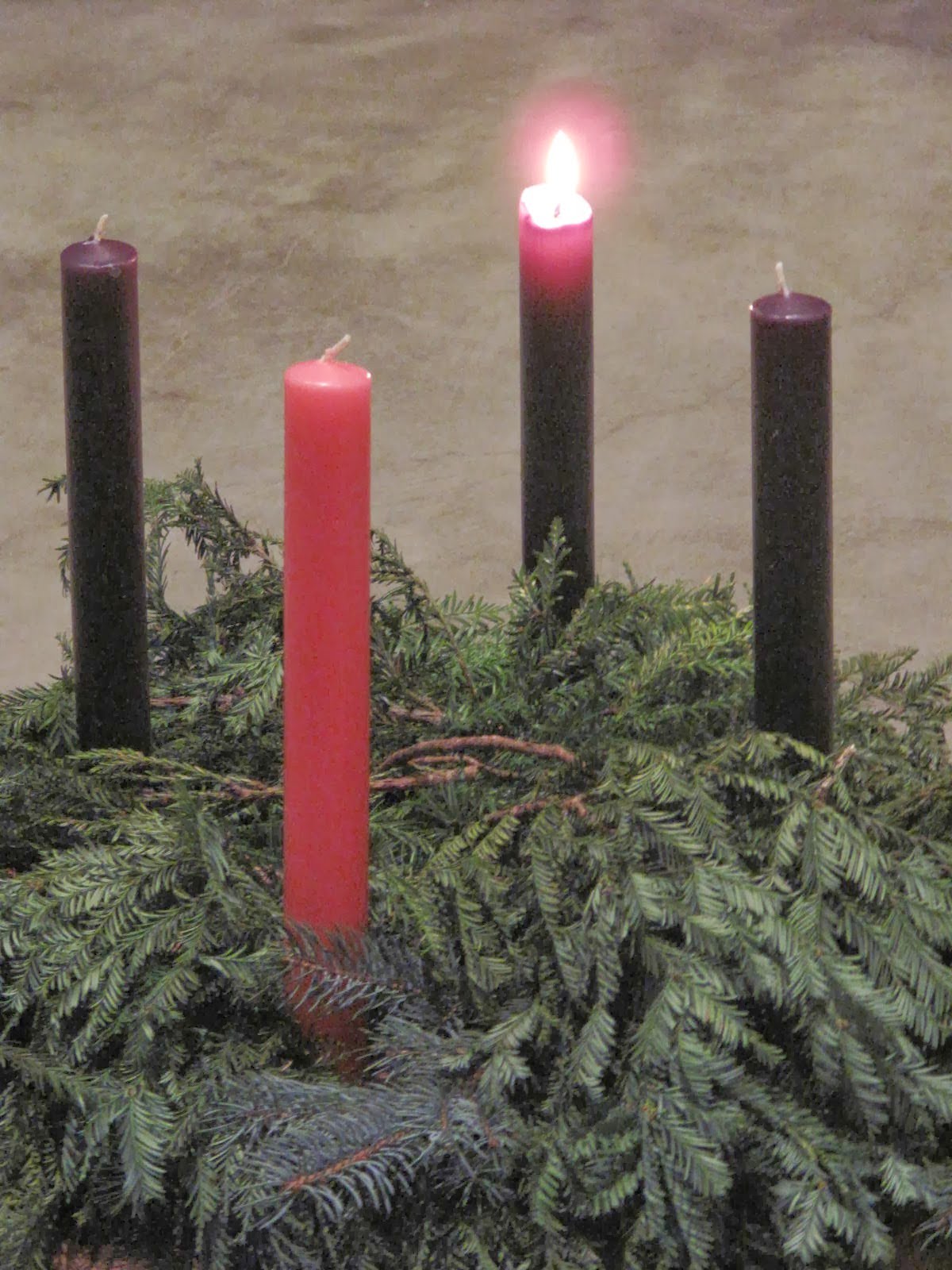Chronos-Kairosmeet as we enter the new liturgical year, which begins with Advent: chronos, historical time…kairos, the in-breaking of Divine life into human history. The season of Advent calls us to feel into and to believe in this pregnant moment of possibility. Advent ushers in the liturgical New Year, but it is not just another year…it is a very important time for all of our lives, for God is to be born again in the human heart, in the dry darkened places of our lives, in those places of need…God is to become still more flesh of our flesh.
St. Bernard, following other patristic writers, spoke of the three times of Advent, or three comings: the first is the birth of Jesus in history, well over 2,000 years ago, the second is this present time, which opens us to the birth of Christ in the soul, a reality that Advent prepares us for. We can also say that our lives are lived in a continual Advent, for God is coming to us, God is being born in us all the time. And the third Advent is the coming of Christ at the end of time. The Advent season focuses on the first two comings while the third is in eternal suspension in the background of our consciousness.
“Christ is at once he who has come and he who is to come. He is always the one who is to come,” writes Jean Daniélou (Prayer, p.72). He has come…and we are still waiting…he has come and he is still being born again and again…The liturgical season of Advent carves out a period of time where we focus on this amazing mystery and gift of God, of Divine life incarnating, being born in our human, imperfect, and wounded lives.
Jean Daniélou continues: “We must allow Christ to pervade our souls to the extent that he becomes all in all” (p.73). This is the scope of Advent: it touches our deepest longing and desire for God to be all, ‘to be all in all’ in our lives. What does it mean to ‘allow Christ, the Divine life, to pervade our souls’? I like to excerpt some images and phrases from the first reading of Isaiah, which we will hear at Mass. ‘You who are our Redeemer forever, why do you let us wander from your ways and harden our hearts so that we fear you not?’ We wander away from our center, from the ‘one thing necessary’…and in the process this heart of ours becomes hardened. It could be fruitful during Advent to simply notice what is happening inour heart or to our heart…for it seems to me once we wander away…and the heart hardens we are disconnected from the place where this new ‘gesture of God’ is to happen…we are disconnected from this deep longing of the soul for God to become all in all in our lives.
‘Would that we be mindful of you O Lord in our ways?’ To be mindful…the gospel uses the words ‘be watchful’…’be alert’, attentive…perhaps this alone is enough to welcome the Word that is to bestow new life upon us. ‘There is none who call upon your name, who rouses themselves to cling to you’ the Isaiah reading continues. And what of us…are we importuning in our prayer, crying out in our need, in our longing for God? Are we clinging in faith as we wait for this ‘gesture’ of life that God wants to birth forth in us? The Isaiah reading ends by reminding us that ‘we are the clay and you, God, the potter: we are all the work of your hands.’ This work of God, that we are, is not finished…we need this birth as much as God does. This birth is about a new creation…something new is to become part of who we are in this present time.
The Dominican theologian of the late 13th and early 14th century Meister Eckhart focused many of his treatises on the incarnation, and specifically on the Divine birth in the soul. According to one author commenting on Eckhart’s thought, she writes that detachment for Eckhart was “an indispensable attitude on the spiritual path: it is the only way that the ‘Birth of Christ’ can take place in the soul” (Journey to the Heart, Kim Nataraja, p.210). What Eckhart means by ‘detachment’ is important to understand. Eckhart employs a German word that nuances his understanding of ‘detachment’: the word he uses means “to slightly stand apart”. Is this not a potent and fertile image to take into Advent: that is, in our interior life ‘to slightly stand apart’ before all the emotional content, anxieties, fears, murmuring tapes that come up? To quote the author of this essay: “Instead of being pulled hither and thither by the emotional responses of our ‘individual being’ to what happens to us, we need to stand slightly outside the turmoil of everyday life. And it is contemplative prayer that helps us to do this” (p.210).
Advent has begun: Let us stand slightly apart, yet with a faith connected to God’s promise: the promise of a new manifestation of life, Divine life. God will surely come bestowing new hope and peace upon our lives, the Church and the world. We, and all creation, are the work of God’s hands and God’s continuous incarnation into all that he has created will not disappoint.
Corpus Christi 2025
“Do this in remembrance of me”: with each Eucharist Jesus’ total self-gift and offering is present, in our midst and within our hearts. ‘Remembrance’ is not only an event of


